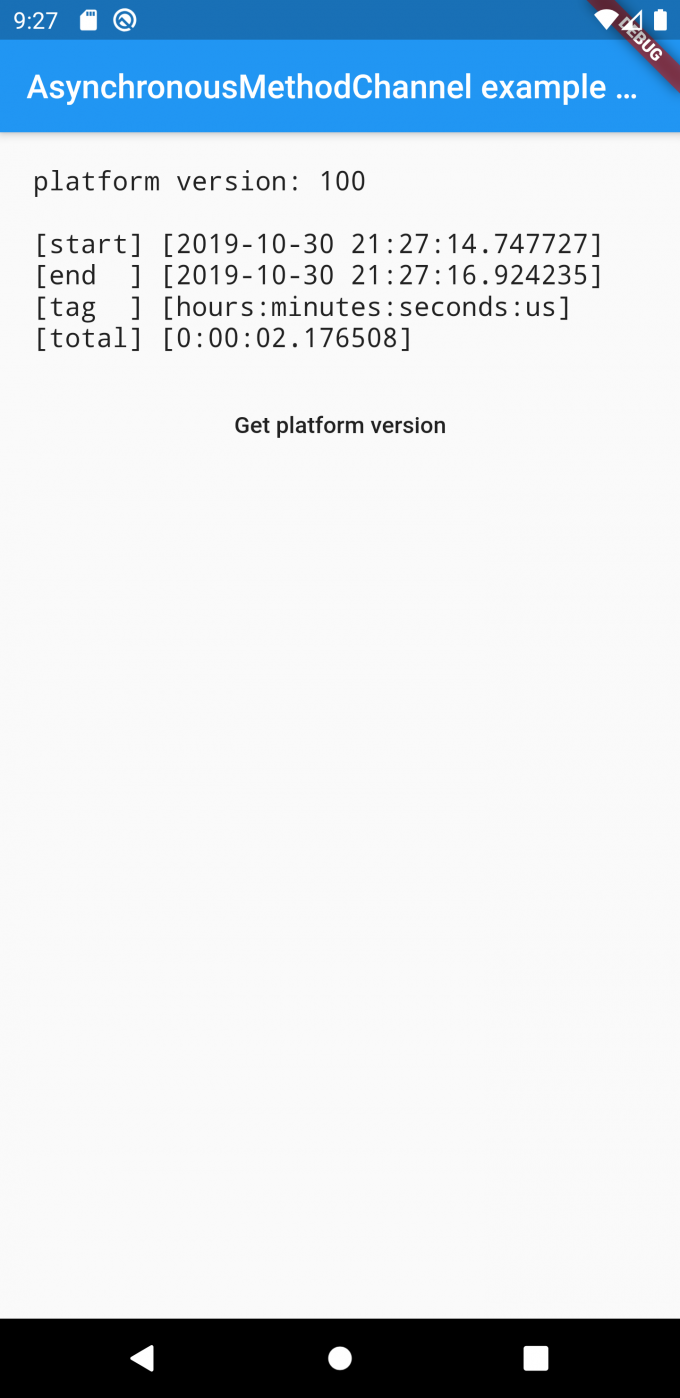Flutter在平台方法调用中异步返回结果
asynchronous_method_channel是一个在Flutter和Native之间异步调用方法时,支持异步返回结果的插件。
在利用Flutter编写跨平台应用时,一些功能需要调用Native方法才能实现,可以利用Flutter为我们提供的MethodChannel实现。对与Flutter来说,所有的Native方法调用都是异步返回的,但是对于Native来说,对于来自Flutter的方法调用,我们要返回的结果却不能异步返回,如果我们尝试在执行异步操作之后调用result.success(something),执行时会得到java.lang.IllegalStateException: Reply already submitted的错误信息。所以AsynchronousMethodChannel是对MethodChannel的一次封装,为其添加了异步返回方法调用结果的功能。因为对于Flutter,和Native的通信即方法调用必须在平台主线程,但我们又知道应该尽量避免在主线程进行耗时操作,所以需要有一个措施来支持平台方法调用时异步返回结果,即编写本库的目的。
关于asynchronous_method_channel
Example: github.com/microtears/…
Repository: github.com/microtears/…
Documentation: pub.dev/documentati…
View/report issues: github.com/microtears/…
Flutter配置
- version: v1.9.1+hotfix.6
- channel: master
在Android上通过AsynchronousMethodChannel和kotlin编写插件
下面是一个利用kotlin协程执行异步任务并返回结果的示例。
在正式开始之前,需要我们了解的一件事是:Flutter应用程序中Android模块的gradle不会自动导入我们需要的Java包,您必须手动添加以下代码。
import io.flutter.plugins.asynchronous_method_channel.AsynchronousMethodChannel
class MainActivity: FlutterActivity() , AsynchronousMethodChannel.MethodCallHandler {
companion object{
const val CHANNEL="AsynchronousMethodChannelExample"
}
private var parentJob = Job()
private val coroutineContext: CoroutineContext
get() = parentJob + Dispatchers.Main
private val scope = CoroutineScope(coroutineContext)
override fun onCreate(savedInstanceState: Bundle?) {
super.onCreate(savedInstanceState)
GeneratedPluginRegistrant.registerWith(this)
AsynchronousMethodChannel(flutterView, CHANNEL).setMethodCallHandler(this)
}
override fun onMethodCall(call: MethodCall, result: AsynchronousMethodChannel.Result) {
when (call.method) {
"getBatteryLevel" -> {
result.success(null)
scope.launch(Dispatchers.IO){
// Do something
// Perform asynchronous time-consuming tasks
// Just return results after 2 seconds
delay(2000)
// The method in AsynchronousMethodChannel.Result must be called on the main thread of the platform
scope.launch(Dispatchers.Main){
result.successAsynchronous(getBatteryLevel().toString())
}
}
}
else -> result.notImplemented()
}
}
private fun getBatteryLevel(): Int {
val batteryLevel: Int
batteryLevel = if (Build.VERSION.SDK_INT >= Build.VERSION_CODES.LOLLIPOP) {
val batteryManager = getSystemService(Context.BATTERY_SERVICE) as BatteryManager
batteryManager.getIntProperty(BatteryManager.BATTERY_PROPERTY_CAPACITY)
} else {
val intent = ContextWrapper(applicationContext).registerReceiver(null, IntentFilter(Intent.ACTION_BATTERY_CHANGED))
intent!!.getIntExtra(BatteryManager.EXTRA_LEVEL, -1) * 100 / intent.getIntExtra(BatteryManager.EXTRA_SCALE, -1)
}
return batteryLevel
}
override fun onDestroy() {
// cancel all asynchronous jobs
scope.cancel()
super.onDestroy()
}
}
在Flutter上通过AsynchronousMethodChannel和dart编写插件
下面是一个在Flutter应用程序中使用AsynchronousMethodChannel的示例。
class _MyAppState extends State<MyApp> {
static final platform =
AsynchronousMethodChannel('AsynchronousMethodChannelExample');
String _batteryLevel = 'Unknown';
String _timeInfo = "";
static const style = TextStyle(
fontSize: 16,
fontFamily: "monospace",
);
@override
void initState() {
super.initState();
initPlatformState();
}
// Platform messages are asynchronous, so we initialize in an async method.
Future<void> initPlatformState() async {
String batteryLevel;
// Platform messages may fail, so we use a try/catch PlatformException.
try {
final sb = StringBuffer();
final startAt = DateTime.now();
sb.writeln("[start] [$startAt]");
batteryLevel =
await platform.invokeAsynchronousMethod("getBatteryLevel");
final endAt = DateTime.now();
sb.writeln("[end ] [$endAt]");
sb.writeln("[tag ] [hours:minutes:seconds:us]");
sb.writeln("[total] [${endAt.difference(startAt)}]");
_timeInfo = sb.toString();
} on PlatformException {
batteryLevel = 'Failed to get platform version.';
}
// If the widget was removed from the tree while the asynchronous platform
// message was in flight, we want to discard the reply rather than calling
// setState to update our non-existent appearance.
if (!mounted) return;
setState(() {
_batteryLevel = batteryLevel;
});
}
@override
Widget build(BuildContext context) {
return MaterialApp(
home: Scaffold(
appBar: AppBar(
title: const Text('AsynchronousMethodChannel example app'),
),
body: Padding(
padding: const EdgeInsets.all(20.0),
child: Column(
crossAxisAlignment: CrossAxisAlignment.start,
children: <Widget>[
Text('Battery level: $_batteryLevel\n', style: style),
Text(_timeInfo, style: style),
Center(
child: FlatButton(
onPressed: initPlatformState,
child: Text("Get battery level"),
),
),
],
),
),
),
);
}
}
截图

在测试时使用AsynchronousMethodChannel
void main() {
TestWidgetsFlutterBinding.ensureInitialized();
final AsynchronousMethodChannel channel =
AsynchronousMethodChannel('asynchronous_method_channel');
setUp(() {
channel.setMockAsynchronousMethodCallHandler(
(MethodCall methodCall, MockResult result) async {
switch (methodCall.method) {
case "asynchronousMethod":
// Delay 30 milliseconds to return results
Future.delayed(Duration(milliseconds: 30),
() => result.success(methodCall.arguments));
break;
case "syncMethod":
return "ok";
break;
case "getBatteryLevel":
result.success("100");
break;
}
return null;
});
});
tearDown(() {
channel.setMockAsynchronousMethodCallHandler(null);
});
test('testMethod', () async {
expect(
await channel.invokeAsynchronousMethod(
"asynchronousMethod",
{"arg": "arg1"},
),
{"arg": "arg1"},
);
expect(
await channel.invokeMethod("syncMethod"),
"ok",
);
expect(
await channel.invokeAsynchronousMethod("getBatteryLevel"),
"100",
);
});
}
在IOS上使用AsynchronousMethodChannel
预计在下一个版本发布。
关于更多
请参阅示例。